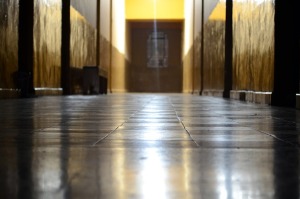Moodiness is one of the characteristics of creative people. They prefer intuition and feeling; they experience high levels of excitability; they’re sensitive; they’re “inner directed,” and inside is where the moods are. They approach their work with an almost mystical intensity, and feel the pleasure and excitement that comes from meeting creative challenges. And the deep joy in producing a work that means a great deal to them. They have to learn to control and regulate their moods so they aren’t overwhelmed by them.
 Russian author Anton Chekhov observed that unhappy writers write happy stories and happy writers’ stories are unhappy. Was he right? He said, “The more fun I’m having, the more depressing my stories are.” A study of composers found that they did their most creative work when they were in the most pain and facing serious life difficulties like marital and legal problems. Gustave Flaubert told his girlfriend, “You should write more coldly. Everything should be done coldly, with poise.”
Russian author Anton Chekhov observed that unhappy writers write happy stories and happy writers’ stories are unhappy. Was he right? He said, “The more fun I’m having, the more depressing my stories are.” A study of composers found that they did their most creative work when they were in the most pain and facing serious life difficulties like marital and legal problems. Gustave Flaubert told his girlfriend, “You should write more coldly. Everything should be done coldly, with poise.”
All his life, Gabriel Garcia Marquez experienced a mood that is so common among writers and artists—he was frightened at the moment he sat down to work. But fear or no fear, he won the Nobel Prize, so how debilitating could the fear have been? Writer Joan Didion speaks of dread: “I don’t want to go in there at all. It’s low dread every morning…I keep saying ‘in there’ as if it is some kind of chamber, a different atmosphere. It is, in a way. There’s almost a psychic wall. The air changes. I mean you don’t want to go through that door.” But exuberant Thomas Wolfe was fearless and found the act of writing a “wild ecstasy.”
A writer or artist in an optimistic mood with high positive expectations has the advantage of being able to generate  positive memories and large amounts of information. Good memories and that much information enable him/her to work creatively. A mood of boredom decreases artistic productivity. But a good mood improves a creator’ problem-finding and problem-solving abilities
positive memories and large amounts of information. Good memories and that much information enable him/her to work creatively. A mood of boredom decreases artistic productivity. But a good mood improves a creator’ problem-finding and problem-solving abilities
It’s clear that regardless of the type of writing or painting you are doing, the act of doing it almost always improves your mood. Unless, that is, you’re working on a subject you feel no emotions about, neither positive nor negative. Then you don’t experience the uplifting emotional effects of working. The topic is bland; your mood is bland. But generally after writing or painting, sculpting, dancing, etc., creators’ moods are elevated. They may start their work in anger, for example, or depressed, but after finishing an hour’s work feel happier, more satisfied, more delighted, more joyful, and also calmer, less nervous, more relaxed and enthusiastic, serene, and peaceful. Positive mood or negative mood depends very much on how satisfied you feel with your performance. “Is the work going well or poorly?
Mood can have a profound and dangerous effect on creative people. They have a higher rate of mood disorders—a  fantastically higher rate—and poets, male or female, more than any other kind of creators. Poets—particularly female poets–have a high suicide rate. American poets Anne Sexton and Sylvia Plath are prominent examples. Female poets are significantly more likely to sufferer from mental illness than other types of female writers. Poets have the highest rate of depression and greatest number of suicides of all occupations. Studies consistently find that 50%-80% of creative writers studied suffered from a mood disorder. A very high percentage of the writers on the faculty of the famous Iowa Writer’s Workshop studied over a fifteen year period had bipolar or other serious mood disorders.
fantastically higher rate—and poets, male or female, more than any other kind of creators. Poets—particularly female poets–have a high suicide rate. American poets Anne Sexton and Sylvia Plath are prominent examples. Female poets are significantly more likely to sufferer from mental illness than other types of female writers. Poets have the highest rate of depression and greatest number of suicides of all occupations. Studies consistently find that 50%-80% of creative writers studied suffered from a mood disorder. A very high percentage of the writers on the faculty of the famous Iowa Writer’s Workshop studied over a fifteen year period had bipolar or other serious mood disorders.
Another creator’s mood is envy. Envy has been called “the writer’s disease,” and I suppose it might just as well be called the painter’s, sculptor’s, actor’s, and ballerina’s disease too. Envy is based on a “scarcity mentality,” the anguish caused by the belief that there is not enough money, opportunities, fame, etc., to go around. Envy may create painful feelings of inadequacy as the writer or artist thinks so-and-so is better or more successful than they are. Although it can motivate  you to do better than those you envy, it can also make you lose focus. But if you free yourself from comparison to others, or from any preoccupation with yourself—your fame, your wealth, your status–you’ll overcome envy and other impediments to your best work. Your focus will be on the work 100%, nothing left over for anything else. All your attention will be brought to bear on the thing to be written or painted.
you to do better than those you envy, it can also make you lose focus. But if you free yourself from comparison to others, or from any preoccupation with yourself—your fame, your wealth, your status–you’ll overcome envy and other impediments to your best work. Your focus will be on the work 100%, nothing left over for anything else. All your attention will be brought to bear on the thing to be written or painted.
Many would-be writers and artists wait for the “right” mood before they begin. My father was a machinist and often wasn’t in the mood to go in to work. But he never missed a day. I don’t see what’s so special about writers and artists that they can’t do the same. Whether you are a machinist or a creator of great works, there is no such thing as being perfectly ready to work; there is just work that should be done whether you feel in the mood or not. To Norman Mailer, that was the difference between professional writers and amateurs. He said, “By professionalism I mean the ability to work on a bad day.”
And remember that whatever mood you’re in when you begin working, when you quit for the day you’ll probably feel terrific.
© 2015 David J. Rogers
Order Fighting to Win: Samurai Techniques for Your Work and Life eBook by David J. Rogers
or
Order Waging Business Warfare: Lessons From the Military Masters in Achieving Competitive Superiority
or


As always your posts are timely, David. At the moment I am participating in an intense 30 paintings in 30 days challenge and pushing myself is a different way of working for me as I am usually pulled along by excitement. So I have found whilst I work my way though a small painting a day, knowing it must be finished before the light fades, that I am thinking a lot, my mind is taking me down lots of little passage ways, some quite murky, others bittersweet, but mostly all melancholy. Changing my working style is having a significant impact on my mood. I still experience the joy of completing a piece, perhaps doubly so because the pressure is off for the day, and I am also quite excited to see my series of little paintings grow each day knowing that I will have enough paintings for an exhibition when the challenge is over. And not only that, perhaps I will realise that the real benefit of this little experiment was to address and process the darker emotions which I suspect lurk within us all but are invariably denied and glossed over. And thank you for including that beautiful photo of the red rose, I’m working on red roses today and tomorrow!!
LikeLike
Michelle, as always, your comment stirs my thinking. It brings to mind experiments I might try. I generally work very slowly, carefully, meticulously, and am not usually given to spontaneity–except of course in the original idea for the piece of work that, as you know, just appears. Based on what you say, I might try the approach your challenge has forced you into. 30 paintings in 30 days! I know that Picasso could do that, but it seems so difficult to me. I find it very interesting that accelerating the work stirs up melancholy thoughts. I would have thought just the opposite, that the enthusiasm you feel would generate positive moods. But you’re an unusual person, so it’s not surprising that your reactions are what I think are unusual. When doing so many paintings in a month, are you losing sleep? I once wrote a book under a deadline and worked on it 18 to 20 hours a day for a year. Of course, it took me another 2 years to overcome the ill effects of it. Re: the darker emotions that lurk, they flit in and out of my mind too, during the days and nights of work, but I always tell myself to put them aside for now until I finish my work for the day. And D.H. Lawrence said that one cures one’s illnesses in art. Good luck on the project, and thanks for the comment.
LikeLike
Thank you David, for your thoughtful comments. I know beautiful things, take diamonds for example, can be created under pressure, but it is perhaps not my preferred style. I do think it is fascinating that changing our working style obviously effects our thought-processes and moods, but I am not losing sleep, quite the opposite, I’m exhausted! Certainly participating in the 30 paintings in 30 days challenge has been a valuable and cathartic experience for me, but I’m looking forward to a change of pace and mood in October when I plan to visit 15 rose gardens in 18 days!
LikeLike
Michelle, you have astounding energy. Hope you enjoy your garden tour.
LikeLiked by 1 person
Great Article,
Sometimes due to my emotions and state of mind I am unable to connect with what I am writing.
I then try to deal with the emotions and why I feel like that but still find that I am unable to connect with my story. Its like I am writing but I am not at all connected with the story.
How do I deal with this?
LikeLike
Lorra, for whatever reason your mind is snagged and you can’t focus the way you need to focus to write. You can’t write because your mind is preoccupied with what you’re feeling and the other stuff you’re thinking that keeps you from thinking about the text you’re trying to produce—and the text should be your complete 100% focus. Your mind is in a turmoil. No one can figure out exactly what their mind is up to. The human mind is devilish and gets a kick out of playing tricks. You can try to calm it down with relaxation techniques and/or you can just continue writing whatever you’re feeling. If you continue writing then eventually you’ll get caught up and absorbed in the writing. That’s a guarantee. It might be a good idea not to stop and try to analyze what you’re feeling and thinking as you now do (which is another thing you’re doing that actually keeps you from writing). Just say to yourself, “My emotions and thoughts right now don’t concern me in the least. All that does concern me is what is in front of me on the screen—those words right there and other words I have to put there. Everything else is secondary to that”—and bring your mind back again and again to the work, one idea, one word, at a time. Eventually your mind will focus on the work if you’re patient and just stop worrying about how you’re feeling and any other distraction. Just keep pecking away at those keys. Bend over the keyboard, focus on the words and keep writing. Talk aloud to yourself—make your lips move–and say, “Just keep writing. Don’t stop I’m doing well.” Read aloud what you’re writing. Tell yourself what you’re doing; “Right now I’m looking for the right word. I think these tips will help get you out of the snag that interferes with your work. Let me know how you’re doing
LikeLike
Hello David, I am a visionary artist and just want to tell you how much I appreciate your articles ! I often have to force myself to start working on my paintings and do everything else before I start. But when I paint, I really feel wonderful during and after the process ! Sometimes even ecstatic ! I don´t know, why I have this dread, that I “can´t do it any more” – because it is not true ! Of course, having 3 different professions besides being a housewife, also is a challenge… Anyway – your articles are very encouraging – thank you ! Gratefully – Anandawww.anandasart.com
LikeLike
Ananda, of course an important point is that you do overcome your hesitation and are able to work on your visionary art. I can’t tell you how many writers and artists I’ve encountered who are unable to overcome distractions and fears–yes, fears–and complete their work. I tell them to make it a goal to complete one work, just focus on that one, regardless of how they feel and other responsibilities and distractions they might have. You seem to be able to do that despite a very busy life. I’d like to know more about how you do it. It would seem to me that you would have to budget your time very strictly, but maybe that’s not how you work. Best wishes to you and hope to hear from you again.
LikeLike
Great advice for everyone!
LikeLike
Roslyn, knowing what a busy and hardworking person you are, I’m not surprised that advice to focus on the task at hand regardless of your mood would appeal to you. I’m sure you do that every day.
LikeLike
Hi David. I love your last point – indeed what is so special about an artist that a bad day should halt her work? We all have bad days, so what? I know what you mean about fear – I call it resistance, especially when I’m starting anything new, or if I’m unsure of myself or my abilities. Like now for instance, when I have an essay to write that I am not exactly how to go about. Tomorrow morning though, I will plan it out, and then I will be fine :). A plan and then action is my antidote to fear.
LikeLike
Sara, you have given yourself some extra challenges by going back to school. It’s the enormity of those challenges that keeps many people from doing what you’re doing. But as you say, you made a decision, then a plan, and now you’re doing it. That fear or resistance that creative people have at the beginning of a work day is so universal that it makes me wonder what causes it. It seems like some self-sabotaging trick the mind is playing, but I think your antidote is a good one. When you make a plan, you’re well on your way to overcoming the resistance, bringing it under control. I’m a firm believer that the creative person has important work to do and has to learn to do it whatever emotions they’re feeling and whatever conditions they’re working under. (That’s the stoic in me.) You seem to be very good at that. Just look at how regularly you’ve kept up your blog at a high standard while doing everything else you manage to do.
LikeLike
I totally agree David. I have a bit of the stoic in me too – when i put my mind to something I am both determined and disciplined. “I don’t want to” is a phrase than annoys the hell out of me, especially if it comes from an adult. Either it needs to be done or it doesn’t. What does want have to do with it? LOL I am such a badass (I love that American saying, it cracks me up) 😀
It is strange how it seems to be an almost universal experience, and I’m guessing that all successful artists find their way around it in their own way. I wrote in my blog yesterday that a creative life was not the life of least resistance…apparently that statement has more depth to it than I realised!
LikeLiked by 1 person
I feel frightened when I am drawing or making images and maybe I am not good at it but I enjoy when I get going.I never feel frightened writing with words.If I am stuck I write limericks.If I feel sad I learn a new poetic form.I find sometimes I don’t understand what I have written for a week or two.I like your article.You are a deep and thoughtful person.I also come from a place where we talk on the street but in London people ask me if I am a foreigner! I’ll have to watch out with Brexit in case they try to send me back to Scandinavia where the Vikings came from.I must say it’s really been so upsetting to see the level of hate and anguish since the Referendum.I hope it will improve but the government is weak
Well, it is good we have met.I look forward to more of your writing
LikeLike
Hello Katherine. Thank you for your compliment. I take whatever I write seriously and always try to give each thing my best effort. Many creators feel fear when they start to work. I haven’t for a long time. All I feel is joy. But almost all feel good after a few minutes. I think you may feel fear drawing simply because you are not confident about your skill, but when you write you are confident and feel no fear. Once your drawing skills improve, you will feel less fear. Build up your skill. Even if you’re afraid, keep drawing.
I’m not familiar at all with British politics. I shy away from such as that here in the U.S. It’s a shame if anyone is hated for what they believe or is afraid to express an opinion.
I hope you have a very productive creative week ahead.
LikeLiked by 1 person
Thank you,David.I hope your week will be very creative too.
LikeLike
Excellent post, Sir! It gives me lots to chew on before I write tomorrow morning. x
LikeLike
Dear Jean-Lee, I’m happy you liked the post and I thank you for your comment. I hope your writing is going well and you’re happy with it.
Best wishes,
David
LikeLiked by 1 person
Thank you! Well I’m tangled up a bit with one story, but I’m sure I’ll unknot the bugger somehow. 🙂
LikeLike
Sounds like fun. I’m sure you’ll be able to do it.
David
LikeLiked by 1 person
Thank you!
LikeLiked by 1 person